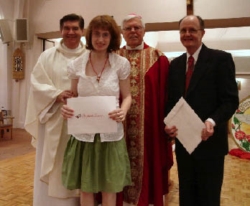Workshop helps tailor religious ed. for special needs children
HANOVER -- Picture yourself at an important job interview with a severe hangover and an audience heckling you while you try to answer questions. Catherine Boyle, the director of special needs religious education at St. Mary Parish in Winchester, employed this somewhat humorous illustration to explain what it is like to be autistic.
“These kids are under an extreme amount of pressure all the time,” she said. “To expect a child with autism to not have difficulty communicating is like expecting a child in a wheelchair to get up and walk. It is their disability.”
Boyle spoke at a workshop for directors of religious education in the Archdiocese of Boston, held at St. Mary of the Sacred Heart Parish in Hanover on June 5. She presented tips for teaching children with autism and other special needs as well as a curriculum she has adapted from the Rose Fitzgerald Kennedy Program to Improve Catholic Religious Education for Children and Adults with Mental Retardation. Boyle developed the curriculum to help her son, who has autism, learn about the Catholic faith.
The archdiocesan Office of Religious Education sponsored the workshop in an effort to help parishes provide education to those with learning challenges. Each participant was given a packet of information and a CD that contained lesson materials that could be printed out.
Boyle stressed that parishes need to be prepared to educate children with autism. Currently one in 150 children are diagnosed with autism, up from one in 10,000 in 1994, according to the Centers for Disease Control and Prevention.
“If you haven’t seen it in your parish, you will,” Boyle said.
The vast majority of these children have the cognitive ability to learn about the faith when it is presented in a way they can understand, she added.
Autistic children have social, com-munication and sensory impairments. They have difficulty understanding verbal communication because it is difficult for them to interpret more than one type of sensory input at a time, she said.
Because of these challenges, children with autism need a routine and clear rules. They need information repeated, not rephrased, to ensure understanding. They are often intelligent and have good memory, but they must receive information in a way that will help them learn it and then be able to retrieve that information later, she said.
In her curriculum Boyle recommends that students be in classes of three so that they can receive individual attention and so that they can get breaks that one-on-one attention would not afford. Pictures should be used since children with autism often learn best from visual stimulation. The same pictures should be used each class to “build a visual language of God.” To ensure comprehension, teachers need to elicit some sort of response from their special needs students, whether it comes in the form of a verbal response or sign language, she said.
These methods, designed for children with autism, have worked well to educate those with Down syndrome, cerebral palsy and other special needs, Boyle said.
Sacramental preparation for special needs students is home-based, and there is no specific year when a student will receive the sacraments. The child receives the sacraments when he or she is ready, which is determined by the parents and teachers, she said.
Boyle added that it took three years of instruction before her son was able to attend an entire Mass every Sunday. He was able to do that for five years, but once he reached adolescence, began to struggle with attending the entire Mass. He brings a book made for him that explains the parts of the Mass and what is expected of him while he is there, she said.
One page reads, “I can try to sit down when everyone else sits down at Mass.”
Sometimes an autistic child can try very hard to sit still and is not able to, Boyle said. The Mass book stresses the importance of trying so that the child will be motivated to continue to put in the effort.
Working with children who have autism and other special needs may seem difficult and intimidating to religious educators, said Anne Vail, coordinator of the religious education for St. Thomas More Parish in Braintree. Vail is also involved with the South Shore special religious education program for adults of all ages with developmental delays.
The archdiocese wants to help parishes through the workshop and materials provided. Another workshop was held a year ago in Weston, and the archdiocese hopes to hold other workshops in new areas throughout the archdiocese, she said.
“We are really working for the inclusion of all,” she added.
Marilyn Zedik, a campus minister at the Cardinal Cushing School and Training Center in Hanover, invited parents of special needs children to come forward and enroll their children in religious education.
“There are just so many people we know we’re not seeing or hearing from. We just want to extend a welcome to the families,” she said. “We just consider it a privilege to serve this population.”
The Cardinal Cushing Center, headed by the Sisters of St. Francis of Assisi, has been providing educational and spiritual support for children with special needs for 60 years. They have programs for all types of faith, including Jewish, Protestant and Catholic. Last week several students received first Communion, Zedik said.
Pat Harris, assistant director of religious education at St. Patrick Parish in Stoneham, said that attending the workshop was very helpful. Next year, St. Patrick’s will have three new students who have autism and another with Down syndrome. The entire religious education staff wants those students to learn all they can in their 10 years of religious instruction at the parish, she said.
“You can’t do it in a vacuum,” said Harris. “If we’re really going to create community, how are we going to educate these children?”



















